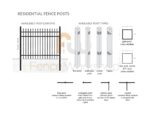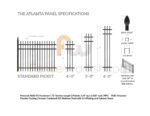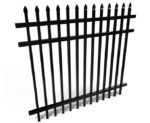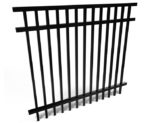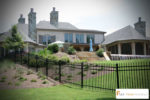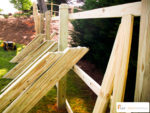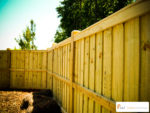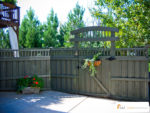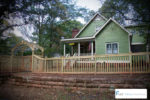When deciding which type of fencing is the best choice for your outdoor project, it’s important to research the pros and cons associated with all of your options. Here, we’ll discuss the key differences between aluminum fence versus wood fencing and which type of projects are ideal for each material.
Aluminum Fencing 411
Chances are, you’re familiar with aluminum fence whether you’re aware of it or not. Many fences that you may have always assumed were steel or wrought iron are actually made of aluminum. Aluminum fences are typically made up of a combination of horizontal rails and vertical pickets. Standard styles are either a smooth top rail or exposed or pressed spear top, but many variations of styles exist or can be custom made by the manufacturer.
Aluminum fence can be used in nearly any setting, from residential landscape projects to commercial or industrial railing projects. Some of the key attributes of aluminum fencing include:
- Aluminum fencing is typically powder coated black, but many manufacturers offer a variety of powder coating color options like white and bronze. You can also find raw aluminum fencing which would look similar to stainless steel.
- One of the most attractive attributes of aluminum fence is its aversion to rust. Unlike steel or wrought iron, aluminum fence does not rust over time and requires almost no maintenance. This makes it an ideal choice for use in wet climates or for projects in close proximity to large bodies of water.
- Aluminum fencing is light weight. This makes it ideal for DIY-ers who are not necessarily well versed in fence installation and aren’t eager to maneuver heavy fence materials. A typical fence panel weighs anywhere between 5 and 10 pounds and can be delivered assembled or unassembled. Its light weight also makes it ideal for use on driveway and estate gates.
- Many aluminum fence manufacturers design their aluminum fence panels to be rackable. This means that the fence can slope up to a certain degree to follow the grade of the ground. Why is this advantageous for the customer? This eliminates gaps that would otherwise be created at the bottom of the fence while still maintaining an even fence line at the top.
- Aluminum fencing comes in a variety of styles, from simple to ornate. Most aluminum fence manufacturers or wholesale retailers will create custom styles as well.
Wood Fencing 411
You’re probably a little more familiar with wood fencing, as it’s one of the most commonly used fence materials around. Many enjoy wood fencing for its classic, natural look, relatively low cost and variety of style options. The most common types of wood fencing include wood privacy fence, wood picket fence, and post and rail wood fence. You’ll commonly find wood fencing in residential and agricultural settings, and less commonly in commercial or industrial settings. Wood fencing is typically composed of some combination of 2x4s, 4x4s, 6x6s, 1x6s or 1x4s.
Key attributes for wood fencing include:
- Wood fencing is a general term that covers a variety of materials – there are many types of wood one could use in the construction of a fence. However, the most commonly used would be Pressure Treated Pine and Cedar, depending upon your location. In many areas, it’s important to use only Pressure Treated Pine for posts that are sitting in the ground, as they tend to hold up better over time.
- Wood fencing can be built to fit almost any residential purpose, from keeping dogs or children safely contained, to fencing for privacy, to picket fences designed to enhance the look of the property.
- Wood fencing should be painted or stained/sealed about a month after installation to protect it from the elements. This is important to include in your wood fence cost estimate for your wood fence project, as many fence installation companies won’t include this service. Staining/painting will typically add $7 – $12/foot to your overall wood fence cost.
- Although it’s generally considered one of the more cost effective fencing options available up front, wood fencing does require quite a bit of maintenance in the long run. It’s important to know that wood fencing will warp over time and require repairs. Furthermore, it’s important to seal or stain your fence to slow the rotting process and protect it from the elements. These are all added costs that you should consider before moving forward with a wood fence.
If you’re located in the Atlanta, GA area and are in need of wood fence repair, contact Fence Workshop for a quick quote!
Aluminum Fence vs Wood Fence – Which Is Better?
As you’ve read above, aluminum and wood both have their strengths and weaknesses and it may be obvious that one material is more appropriate than another depending on the project. However, it is in our opinion that aluminum fencing tends to be the better option in most cases. Here’s why:
- Aluminum fence requires little to no maintenance – an invaluable trait to most customers. Although aluminum fence cost will typically be higher than wood fence up front, you should consider the upkeep and future costs involved in maintaining a structurally sound and good looking wood fence.
- Aluminum fence is perfect for pool enclosures and fencing near bodies of water. By contrast, wood fencing is particularly effected by the air and elements.
- Aluminum fence is powder coated, meaning you’ll never have to worry about painting your fence. Wood fences will need to be stained or sealed about a month after installation to protect them from the elements. This is another “hidden” cost you’ll need to consider with wood fencing.
- Aluminum fence is particularly easy to install. Aluminum fence panels come pre-assembled, and posts come pre-notched. It’s light weight make it easy for almost anyone to handle and move from place to place. Wood fence pieces can be quite heavy and cumbersome to handle and building wood fence requires much more planning, measuring and grunt work.
- Need privacy? While aluminum fence doesn’t typically bode well for those in need of privacy, don’t be afraid to get creative! Remember that landscaping can be used in conjunction with aluminum fence to gain privacy where you need it, without creating a barricade around your property.
Ready to buy aluminum fence materials online? You’re in luck! Fence Workshop provides a wide variety of American made aluminum fence products in their easy-to-use online store, including pre-packaged fence kits. They’ll deliver nationwide to customer’s doorsteps – start shopping today!

